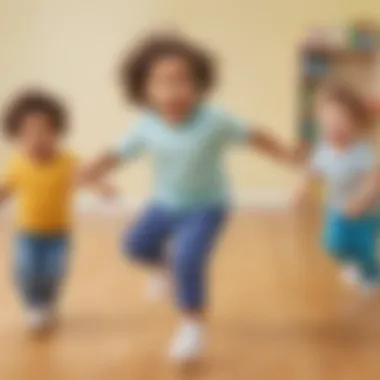Unlocking the Potential: Innovative Gross Motor Skills Activities for Preschoolers


Fun Activities Ideas
When it comes to engaging preschoolers in gross motor skills activities, there's a wide array of fun and exciting options to explore that cater to different interests and learning styles. From high-energy activities to more subdued ones, these choices provide a holistic approach to physical development. Let's delve into some creative ideas:
- Indoor Activities: Transform your living space into a playground with activities like obstacle courses, dance parties, or indoor mini-golf. These activities not only promote physical movement but also foster creativity and problem-solving skills.
- Outdoor Adventures: Take the fun outside with activities like nature hikes, scavenger hunts, or bike riding. Outdoor play not only enhances gross motor skills but also exposes children to the beauty of the natural world.
- Arts and Crafts: Engage in hands-on activities like finger painting, clay modeling, or DIY projects that promote fine motor skills while also encouraging creativity and imagination.
- Science Experiments: Explore the wonders of science through simple experiments that involve movements like pouring, mixing, or observing reactions. Science activities not only enhance gross motor skills but also instill a sense of curiosity and discovery.
- Cooking and Baking: Get busy in the kitchen with your little ones, whipping up delicious treats or simple recipes that involve tasks like stirring, mixing, and maybe even a bit of dancing. Cooking together not only enhances motor skills but also fosters independence and healthy eating habits.
These activities not only keep children physically active but also promote cognitive and social development, making learning a fun and interactive experience.
Introduction to Gross Motor Skills
Gross motor skills play a vital role in the holistic development of preschoolers, encompassing fundamental movements that involve large muscle groups. In this article, we delve deep into the world of gross motor skills activities for preschoolers, shedding light on the significance of honing these skills from a young age. By emphasizing physical development and coordination through engaging activities, we aim to provide a comprehensive guide for parents, teachers, and caregivers seeking innovative ways to foster motor skill development in young children.
Understanding Gross Motor Skills
Definition and Importance
Gross motor skills refer to the coordination and control of large muscle groups to perform activities like walking, running, climbing, and jumping. Understanding the definition and importance of gross motor skills is fundamental in recognizing the foundational movements essential for a child's physical development. These skills lay the groundwork for more complex movements and are crucial for everyday tasks and participation in physical activities. Emphasizing the significance of mastering gross motor skills in preschoolers sets the stage for healthy growth and development, promoting confidence and independence in children's physical abilities. Recognizing the unique features of gross motor skills can lead to tailored activities that cater to individual needs, enhancing overall motor skill proficiency in young learners.
Developmental Milestones
Developmental milestones in gross motor skills mark the progression of a child's physical abilities, from crawling and walking to more advanced movements like jumping and balancing. Tracking these milestones allows caregivers to monitor a child's progress and identify any potential delays or concerns in their motor skill development. By understanding the key characteristics of developmental milestones in gross motor skills, educators and parents can create appropriate activities that support and challenge children at different stages of their development. Celebrating each milestone achieved boosts a child's self-esteem and motivates further skill refinement, shaping their journey towards physical competence and confidence.
Relation to Physical Activity
Role in Overall Health


The role of gross motor skills in overall health extends beyond physical fitness, influencing various aspects of a child's well-being. Engaging in activities that enhance gross motor skills contributes to the development of strength, coordination, and cardiovascular fitness, promoting a healthy lifestyle from an early age. By emphasizing the importance of incorporating gross motor activities into daily routines, caregivers can instill a lifelong appreciation for physical activity, laying the foundation for a healthy and active lifestyle.
Impact on Cognitive Function
Gross motor skills not only benefit physical health but also play a significant role in cognitive function and academic achievement. Engaging in gross motor activities enhances neural connections, improves concentration, and fosters cognitive skills such as problem-solving and creativity. By exploring the impact of gross motor skills on cognitive function, educators and parents can appreciate the holistic benefits of physical activity beyond the gym or playground. Integrating activities that challenge both the body and mind can optimize learning potential and promote well-rounded development in young children.
Key Gross Motor Skills for Preschoolers
In this section, we delve into the fundamental aspect of gross motor skills development for preschoolers, which plays a crucial role in their physical and cognitive growth. Key gross motor skills are essential foundational skills that children need to master to engage in daily activities effectively. These skills encompass a variety of movements that involve large muscle groups and provide the basis for more complex physical tasks as children progress. Recognizing and enhancing these skills early on are vital for children's overall development and future physical capabilities.
Walking and Running
Balancing Techniques
Balancing techniques are a critical component of a child's gross motor skill development as they help improve stability, coordination, and spatial awareness. By mastering balancing techniques, preschoolers can enhance their confidence in various physical activities and tasks, leading to better overall motor control. The key characteristic of balancing techniques lies in the ability to maintain equilibrium and control body position effectively. This skill is a popular choice for this article as it forms the basis for many other gross motor skills and is essential for activities like walking on narrow surfaces or riding a bike. The unique feature of balancing techniques lies in their versatility, offering benefits in both static and dynamic movements. While advantageous in enhancing overall motor skills, one possible disadvantage is that mastering advanced balancing techniques may pose a challenge for some preschoolers initially, requiring consistent practice and guidance.
Speed and Agility Training
Speed and agility training are paramount in improving preschoolers' mobility, reflexes, and coordination. This aspect contributes significantly to enhancing overall physical fitness and promoting a healthy, active lifestyle. The key characteristic of speed and agility training is its focus on quick movements, directional changes, and rapid responses, which are vital for various sports and physical activities. This training is a beneficial choice for this article as it enhances children's ability to react swiftly and move efficiently in different environments. The unique feature of speed and agility training is its dynamic nature, which keeps children engaged and challenged while improving their motor skills. While advantageous in boosting physical performance, a possible disadvantage of intense speed and agility training could be the risk of injury if not properly supervised or tailored to the child's abilities.
Jumping and Hopping
Leapfrog Activities
Leapfrog activities are engaging and fun exercises that aid in developing a child's leg strength, coordination, and balance. These activities contribute to gross motor skill improvement by enhancing muscles used for jumping and landing in a more controlled manner. The key characteristic of leapfrog activities lies in their interactive nature, making them a popular choice for this article as they encourage social interaction and physical engagement among preschoolers. The unique feature of leapfrog activities is their adaptability to different settings and group sizes, allowing for versatile play experiences. While advantageous in promoting leg muscle development and coordination, one potential disadvantage of leapfrog activities could be the risk of falls or collisions if not supervised carefully.
Obstacle Course Challenges


Obstacle course challenges are creative and stimulating tasks that help children enhance their problem-solving abilities, coordination, and agility. These challenges contribute to gross motor skill development by requiring children to navigate through various obstacles using jumping, hopping, crawling, and climbing movements. The key characteristic of obstacle course challenges is their multifaceted approach to improving different aspects of gross motor skills simultaneously. This choice is popular for this article as it promotes creativity, physical activity, and skill progression among preschoolers. The unique feature of obstacle course challenges is their adaptability to different skill levels and settings, offering a scalable difficulty level for children to conquer. While advantageous in fostering physical and cognitive skills, a potential disadvantage of obstacle course challenges may be the need for careful supervision to ensure children's safety while completing the challenges.
Fun and Interactive Gross Motor Activities
In this section of the article, we will delve into the importance of incorporating Fun and Interactive Gross Motor Activities specifically tailored for preschoolers. These activities play a crucial role in the physical development and overall well-being of young children. By engaging in fun and interactive gross motor activities, kids not only enhance their motor skills but also foster a sense of enjoyment and enthusiasm towards physical movement. These activities are designed to be both entertaining and educational, making them a valuable addition to any preschooler's daily routine.
Outdoor Play Adventures
Nature Scavenger Hunts
Nature scavenger hunts are a fantastic way to connect children with the outdoors while focusing on gross motor skill development. These hunts encourage kids to explore nature, enhancing their sensory awareness and physical coordination. The key characteristic of nature scavenger hunts lies in their ability to engage children in a playful manner while promoting physical activity. This activity is particularly beneficial for preschoolers as it combines learning about the environment with movement, making it an enriching experience for young minds.
Sensory Obstacle Courses
Sensory obstacle courses are designed to stimulate various senses while challenging children's gross motor skills. By navigating through different obstacles, kids improve their balance, coordination, and problem-solving abilities. The unique feature of sensory obstacle courses is their multi-sensory approach, engaging children both physically and cognitively. While offering numerous advantages in enhancing motor skills, sensory obstacle courses also provide opportunities for creativity and exploration, enriching the overall gross motor skill development of preschoolers.
Indoor Movement Challenges
Dance Party Workouts
Dance party workouts infuse music and movement, creating a vibrant and dynamic activity that boosts gross motor skills in children. The key characteristic of dance party workouts is their ability to combine fitness with fun, making exercise enjoyable for preschoolers. This activity is a popular choice for this article as it promotes physical activity in an engaging and interactive way. The unique feature of dance party workouts lies in their capacity to improve coordination and rhythm while encouraging children to express themselves through movement.
Yoga for Kids
Yoga for kids offers a holistic approach to gross motor skill development by incorporating poses that enhance strength, flexibility, and balance. The key characteristic of yoga lies in its focus on mind-body connection, promoting mindfulness and relaxation in young children. This activity is beneficial for preschoolers as it not only improves physical fitness but also nurtures emotional well-being. The unique feature of yoga for kids is its adaptability to different skill levels, making it an inclusive and accessible activity for all preschool-aged children.


Creative Sports and Games
Soccer Mini-Matches
Soccer mini-matches provide children with opportunities to engage in team sports while honing their gross motor skills. The key characteristic of soccer mini-matches is their emphasis on teamwork, cooperation, and sportsmanship, fostering social development alongside physical activity. This activity is a beneficial choice for this article as it encourages healthy competition and camaraderie among preschoolers. The unique feature of soccer mini-matches is their ability to improve cardiovascular fitness and motor skills while promoting collaboration and communication on the field.
Basketball Hoop Shootouts
Basketball hoop shootouts challenge children to aim, throw, and move as they strive to score goals, enhancing their hand-eye coordination and agility. The key characteristic of basketball hoop shootouts lies in their ability to sharpen precision and motor skills in a playful setting. This activity is a popular choice for this article as it combines physical activity with skill development, offering a well-rounded approach to gross motor skill enhancement. The unique feature of basketball hoop shootouts is the thrill of competition and achievement, motivating preschoolers to push their limits and improve their athletic abilities.
Educational Benefits and Beyond
In this section of our comprehensive guide on gross motor skills activities for preschoolers, we delve into the essential topic of Educational Benefits and Beyond. Understanding the educational advantages of promoting gross motor skills in preschool-aged children is crucial for their holistic development. By incorporating activities that enhance physical literacy, coordination, and teamwork, parents, teachers, and caregivers can nurture essential skills that go beyond mere movement.
Enhancing Physical Literacy
Improving Coordination
Improving coordination is a fundamental aspect of physical literacy that significantly contributes to a child's overall development. By focusing on activities that challenge balance, spatial awareness, and fine motor skills, children can enhance their coordination abilities. The key characteristic of improving coordination lies in its ability to strengthen the mind-body connection, fostering better control and efficiency in movement. This aspect is particularly beneficial for preschoolers as it sets a solid foundation for future physical activities and sports. The unique feature of improving coordination is that it promotes neural connections in the brain, improving both motor skills and cognitive function simultaneously.
Boosting Confidence
Boosting confidence through gross motor skills activities plays a vital role in a child's emotional and social development. Confidence is a key characteristic that can be nurtured through activities that challenge children to step out of their comfort zones, tackle new physical tasks, and overcome obstacles. By boosting confidence, children develop a positive self-image and belief in their abilities, essential for navigating challenges and successes in life. One advantage of boosting confidence through gross motor activities is that it instills resilience and perseverance in children, teaching them the value of effort and determination.
Social and Emotional Development
Teamwork Building Exercises
Teamwork building exercises provide preschoolers with valuable opportunities to learn collaboration, communication, and empathy. Through activities that require cooperation, such as group games, relay races, and partner drills, children develop essential teamwork skills. The key characteristic of teamwork building exercises lies in fostering a sense of community and shared achievement among children. This aspect is beneficial in teaching children the importance of working together towards a common goal, laying the foundation for strong interpersonal relationships in the future. The unique feature of teamwork building exercises is that they instill patience, understanding, and respect for others' perspectives, promoting a harmonious social environment.
Emotion Regulation Strategies
Emotion regulation strategies help preschoolers recognize, understand, and manage their feelings in various situations. By introducing activities that focus on mindfulness, breathing techniques, and self-expression, children learn to navigate and express their emotions effectively. The key characteristic of emotion regulation strategies is their emphasis on self-awareness and coping skills, empowering children to regulate their emotional responses in a healthy manner. This aspect is beneficial as it equips children with tools to handle stress, conflicts, and challenges, promoting resilience and mental well-being. The unique feature of emotion regulation strategies is their ability to promote emotional intelligence, empathy, and self-control, essential skills for navigating social interactions and building strong relationships.



